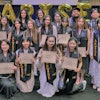By all accounts, Dr. Leslie Wong has had a distinguished career in higher education.
After serving as dean of Evergreen State College and provost and interim president at the University of Southern Colorado, Wong was appointed president of Northern Michigan University, a position he held for eight years. In August 2012, Wong became the 13th president of San Francisco State University, which serves more than 30,000 students.
But Wong’s résumé is also unusual in one respect: he’s an Asian American college president.
While African-Americans make up about 6.2 percent of the nation’s college presidents and Hispanics about 5.9 percent, Asian Americans account for only 1.5 percent. The numbers are equally dismal among other executive positions in the academy, including deans, provosts and vice presidents.
Certainly, there’s been some progress in recent years, with appointments of Asian Americans to top positions at high profile schools, including Seton Hall; the University of Illinois at Urbana-Champaign; the University of Maryland, College Park; the University of Houston; and San Francisco State. But the growth is only a trickle.
Several higher education administrators, scholars and college presidents attribute the low numbers to a variety of factors, including the so-called bamboo ceiling, subtle bias and a perception by some White administrators that people of Asian descent are content with working hard and getting results, and either have no interest in leadership opportunities or simply won’t be good at it.
Sam Museus, an associate professor of higher education at the University of Denver, says that Asian Americans are, in some respects, victims of their own success in the classroom and in the workplace.














